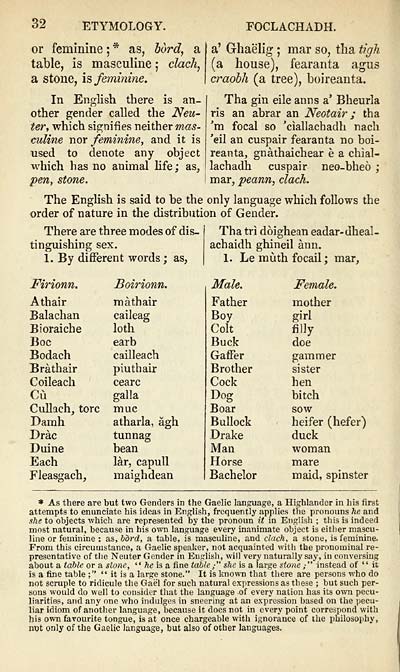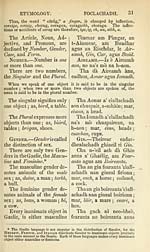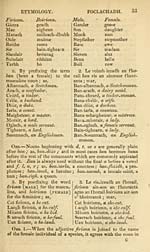Books and other items printed in Gaelic from 1841 to 1870 > Stéidhean a' Ghràmair Ghaëlig
(60) Page 32
Download files
Complete book:
Individual page:
Thumbnail gallery: Grid view | List view

32 ETYMOLOGY.
FOCLACHADH.
or feminine ; * as, bòrd, a
table, is masculine ; clach,
a stone, is femìnine.
In English there is an-
other gender called the Neu-
ter, which signifies neither mas-
culine nor feminine, and it is
used to denote any object
which has no animal life ; as,
pen, stone.
The English is said to be the only language which follows the
order of nature in the distribution of Gender.
a' Ghaelig ; mar so, tha tigh
(a house), fearanta agus
craohh (a tree), boireanta.
Tha gin eile anns a' Bheurla
ris an abrar an Neotaìr ; tha
'm focal so 'cìallachadh nach
'eil an cuspair fearanta no boi-
reanta, gnàthaichear è a chìal-
lachadh cuspair neo-bheò ;
mar, peann, clach.
There are three modes of dis-
tinguishing sex.
1. By different words ; as,
Tha trì dòighean eadar-dheal-
achaidh ghineil ànn.
1. Le mùth focail ; mar,
Firionn.
Boirionn.
Male.
Female.
Athair
màthair
Father
mother
Balachan
caileag
Boy
girl
Bioraiche
loth
Colt
filly
Boc
earb
Buck
doe
Bodach
cailleach
Gaffer
gammer
Bràthair
piuthair
Brother
sister
Coileach
cearc
Cock
hen
Cù
galla
Dog
bitch
Cullach, torc
muc
Boar
sow
Damh
atharla, àgh
Bullock
heifer (hefer)
Dràc
tunnag
Drake
duck
Duine
bean
Man
woman
Each
làr, capull
Horse
mare
Fleasgach,
maighdean
Bachelor
maid, spinster
* As there are but two Genders in the Gaelic language, a Highlander in his first
attempts to enunciate his ideas in English, frequently applies the pronouns he and
she to objects which are represented by the pronoun it in English ; this is indeed
most natural, because in his own language every inanimate object is either mascu-
line or feminine : as, bòrd, a table, is masculine, and clach, a stone, is feminine.
From this circumstance, a Gaelic speaker, not acquainted with the pronominal re-
presentative of the Neuter Gender in English, will very naturally say, in conversing
about a table or a stone, " he is a fine table ,•" she is a large stone ;" instead of " it
is a fine table ;" " it is a large stone." It is known that there are persons who do
not scruple to ridicule the Gael for such natural expressions as these ; but such per-
sons would do well to consider that the language of every nation has its own pecu-
liarities, and any one who indulges in sneering at an expression based on the pecu-
liar idiom of another language, because it does not in every point correspond with
his own favourite tongue, is at once chargeable with ignorance of the philosophy,
not only of the Gaelic language, but also of other languages.
FOCLACHADH.
or feminine ; * as, bòrd, a
table, is masculine ; clach,
a stone, is femìnine.
In English there is an-
other gender called the Neu-
ter, which signifies neither mas-
culine nor feminine, and it is
used to denote any object
which has no animal life ; as,
pen, stone.
The English is said to be the only language which follows the
order of nature in the distribution of Gender.
a' Ghaelig ; mar so, tha tigh
(a house), fearanta agus
craohh (a tree), boireanta.
Tha gin eile anns a' Bheurla
ris an abrar an Neotaìr ; tha
'm focal so 'cìallachadh nach
'eil an cuspair fearanta no boi-
reanta, gnàthaichear è a chìal-
lachadh cuspair neo-bheò ;
mar, peann, clach.
There are three modes of dis-
tinguishing sex.
1. By different words ; as,
Tha trì dòighean eadar-dheal-
achaidh ghineil ànn.
1. Le mùth focail ; mar,
Firionn.
Boirionn.
Male.
Female.
Athair
màthair
Father
mother
Balachan
caileag
Boy
girl
Bioraiche
loth
Colt
filly
Boc
earb
Buck
doe
Bodach
cailleach
Gaffer
gammer
Bràthair
piuthair
Brother
sister
Coileach
cearc
Cock
hen
Cù
galla
Dog
bitch
Cullach, torc
muc
Boar
sow
Damh
atharla, àgh
Bullock
heifer (hefer)
Dràc
tunnag
Drake
duck
Duine
bean
Man
woman
Each
làr, capull
Horse
mare
Fleasgach,
maighdean
Bachelor
maid, spinster
* As there are but two Genders in the Gaelic language, a Highlander in his first
attempts to enunciate his ideas in English, frequently applies the pronouns he and
she to objects which are represented by the pronoun it in English ; this is indeed
most natural, because in his own language every inanimate object is either mascu-
line or feminine : as, bòrd, a table, is masculine, and clach, a stone, is feminine.
From this circumstance, a Gaelic speaker, not acquainted with the pronominal re-
presentative of the Neuter Gender in English, will very naturally say, in conversing
about a table or a stone, " he is a fine table ,•" she is a large stone ;" instead of " it
is a fine table ;" " it is a large stone." It is known that there are persons who do
not scruple to ridicule the Gael for such natural expressions as these ; but such per-
sons would do well to consider that the language of every nation has its own pecu-
liarities, and any one who indulges in sneering at an expression based on the pecu-
liar idiom of another language, because it does not in every point correspond with
his own favourite tongue, is at once chargeable with ignorance of the philosophy,
not only of the Gaelic language, but also of other languages.
Set display mode to:
![]() Universal Viewer |
Universal Viewer | ![]() Mirador |
Large image | Transcription
Mirador |
Large image | Transcription
Images and transcriptions on this page, including medium image downloads, may be used under the Creative Commons Attribution 4.0 International Licence unless otherwise stated. ![]()
| Rare items in Gaelic > Books and other items printed in Gaelic from 1841 to 1870 > Stéidhean a' Ghràmair Ghaëlig > (60) Page 32 |
|---|
| Permanent URL | https://digital.nls.uk/101712319 |
|---|
| Description | Out-of-copyright books printed in Gaelic between 1631 and 1900. Also some pamphlets and chapbooks. Includes poetry and songs, religious books such as catechisms and hymns, and different editions of the Bible and the Psalms. Also includes the second book ever published in Gaelic in 1631. |
|---|

